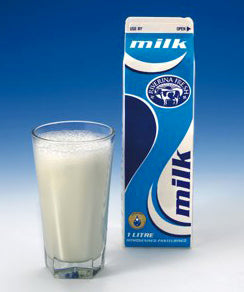Milk Intake, Fractures and the Risk of Mortality in Women and Men
November 04, 2014 3 min read

A new study published in the British Medical Journal October 28, 2014 utilized data from two large, long-term Swedish studies of adult men and women. The study asked about their dietary habits and how much and what types of milk and dairy products they consumed. This new study confirms other long-term meta-analysis studies in 2007 and 2011.
The studies bottom line: Women who consumed three or more glasses of milk a day had a higher risk of fracture and a higher risk of death. Men who drank three or more glasses of milk a day had a slightly higher risk of death, mostly associated with cardiovascular death, compared to those who drank less than one glass a day.
Is it bad to drink milk?
According to the lead researcher Karl Michaelsson, a specific sugar found in milk, D-galactose might play a role. Studies in animals show that D-galactose induces aging and it is linked to increased oxidative stress and inflammation.
What about yogurt and cheese?
“With fermented cheese the level of D-galactose is very low. It’s not as high as it is in milk,” Michaelsson said. “Yogurt also has the probiotic effect of bacteria.”
Is this study proof?
The study is observational, not proof in terms of scientific standards. However, there have been two other large observational studies that have found similar results. Animal studies have shown a connection between the sugar D-galactose and increased aging.
What about the enzyme that breaks down milk?
Lactase is an enzyme that humans make that breaks down milk products. Fermented products have bacteria that have done most of the work, plus the added benefit of probiotics, the “good” bacteria. Of note is that 25% of all African Americans and those from Mediterranean countries are lactose (milk sugar) intolerant meaning, they do not make the enzyme lactase to break down the lactose. The suffix “ose” refers to sugars and “ase” to enzymes. Also, anyone past the age of 40 is susceptible to being lactose intolerant.
What about children and milk?
During the growth years, drinking whole milk can be healthful. Organic milk with fat is the best option. Can children get enough calcium for their growing bones without milk? Perhaps, but as many parents know anything green can send a child into a retching attack. Children who do not eat green veggies can be at risk for low calcium. However, parents can learn how to make smoothies with greens that their children will love.
Keep in mind that milk has sugar and that fat-free milk or yogurt has more sugar. Removing the fat equals more sugar. Don’t lean on milk drinks with added sugar, such as hot chocolate. The other concern is sugary drinks in general. This too can be tough for kids who have already developed cravings for sugary drinks.
But truthfully, soda pop needs to be cut out of our diets completely—both adults and kids— as they are not good for bones and the added calories can put on extra pounds.
Fruit juices are almost as bad, containing large quantities of fructose, another unhealthy sugar! And be sure to read food ingredient labels for sugar content: 4 grams of sugar equals 1 teaspoon .
I do think that adults would benefit from weaning themselves off milk in favor of plain, organic yogurt. One yogurt each day along with other calcium rich foods such as green leafy vegetables will improve your bone health and may even add years to your life.
In my book, Dr. Lani’s No-Nonsense Bone Health Guide there is a more information on calcium rich foods and how to balance calcium with other important nutrients such as magnesium and potassium.
Subscribe
Sign up to get the latest on sales, new releases and more …

